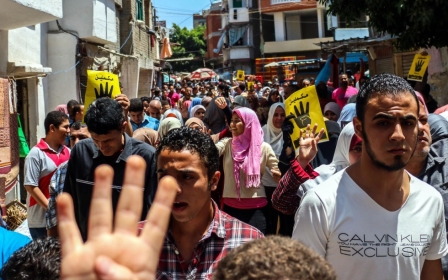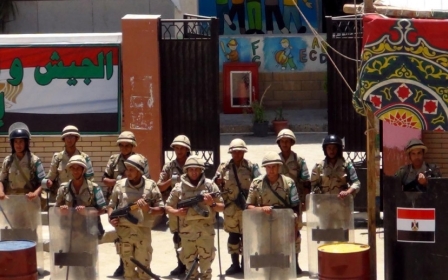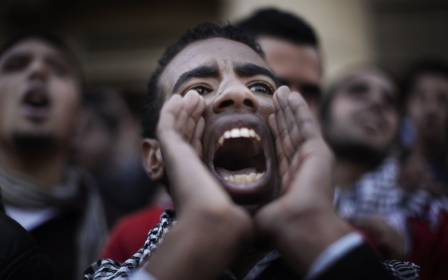Polls open in second day of Egypt vote

Polls opened Tuesday for a second day of voting in Egypt's presidential elections, the first since the military ouster of president Mohamed Morsi, the country's first freely elected president, last year.
The winner of the polls will take over from interim president Adly Mansour, who was installed by the army following Morsi's July 3 ouster and subsequent imprisonment.
In a bid to encourage voters to cast their ballots, the Egyptian government had declared Tuesday an official holiday.
Speaking to the Egyptian television shortly after polls closed at 9pm (local time) on the first day of the ballot on Monday, Prime Minister Ibrahim Mahlab said that the move aimed "to allow all Egyptians to cast their ballot".
Five international organizations and 79 local ones have been authorized by the electoral commission to observe the voting process.
New MEE newsletter: Jerusalem Dispatch
Sign up to get the latest insights and analysis on Israel-Palestine, alongside Turkey Unpacked and other MEE newsletters
In addition to nongovernmental monitors, envoys from the Arab League; the European Union; the African Union; the Common Market for East and South Africa will follow up the vote.
Around 300,000 police and army personnel have been deployed to secure the process nationwide.
The ex-army chief who ousted Egypt's first democratically elected leader and crushed his Islamist movement was set for a landslide presidential election win.
Morsi's Muslim Brotherhood is boycotting the vote, as are revolutionary youths who fear Sisi is an autocrat in the making.
But the 59-year-old retired field marshall is expected to trounce his sole rival, leftist Hamdeen Sabbahi, amid widespread calls for stability.
Sisi himself voted minutes after polling opened Monday amid a throng of jostling reporters and supporters. About 53 million people are eligible to vote.
"The entire world is watching us, how Egyptians are writing history and their future today and tomorrow," Sisi said.
"Egyptians must be reassured that tomorrow will be very beautiful and great," he said, as supporters shook his hand and kissed his cheeks.
Stability vs freedom
Many view the vote as a referendum on stability versus the freedoms promised by the Arab Spring-inspired popular uprising that ousted veteran strongman Hosni Mubarak in 2011.
Since the revolution, the country of 86 million people has been rocked by sporadic unrest and a tanking economy.
Mubarak's successor, Morsi, lasted one year in office, winning Egypt's first democratic presidential poll.
"We need someone who speaks in a determined and strong way. The Egyptian people are frightened by this and respect those who are like this," said Milad Yusef, a 29-year-old lawyer waiting to vote in Cairo.
Yusef said he had voted for Sabbahi in the 2012 election that Morsi won, but that he would now back Sisi.
"We need someone strong, a military man," he said.
Sisi has said "true democracy" would take a couple of decades, and suggested he would not tolerate protests disrupting the economy.
Sisi has raised fears Egypt could see more repression than under Mubarak.
"What tourist would come to a country where we have demonstrations like this?" he said ahead of the election.
Hundreds of soldiers and policemen have also been killed in militant attacks since Morsi's overthrow, with the deadliest claimed by an Al-Qaeda-inspired group based in the restive Sinai Peninsula.
Sisi also pledged to eliminate the Brotherhood, which won every election following Mubarak's overthrow after being banned for decades.
The Islamist movement is boycotting the election, along with the April 6 youth movement which spearheaded the anti-Mubarak revolt, and said Sunday it would reject the outcome.
'Forged' elections
The main support bloc of Morsi has hailed what it described as the "popular boycott" of Egypt's presidential election.
"We have followed with admiration the massive boycott by free Egyptians of the election of blood," the pro-Morsi National Alliance for the Defense of Legitimacy said in a statement on Monday.
"Forgery will never grant legitimacy to a butcher nor will it lessen the determination of revolutionaries," the Brotherhood said.
Voting in the pro-Morsi town of Kerdasa, 35 kilometres (25 miles) southwest of Cairo, was low as loyalists of Morsi stayed indoors.
"Sisi killed youths and now he is grabbing power. This is the biggest evidence that (Morsi's ouster) was a coup," Mohamed Gamal, a law graduate who boycotted the vote, told AFP.
Police raided the town in September after 13 officers were killed following Morsi's overthrow.
The Brotherhood, now blacklisted as a terrorist group, has been decapitated in a police crackdown that has killed more than 1,400 people, including an estimated 700 protesters on one day in August.
Morsi himself has been detained and put on trial.
"This election will not wipe the slate clean after 10 months of gross human rights violations," Hassiba Hadj Sahraoui, Amnesty International's deputy director for the Middle East and North Africa, said in a statement.
Sisi's sole rival Sabbahi. His campaign office denounced "various irregularities" during voting, including the arrest of one of its members in Cairo.
Middle East Eye delivers independent and unrivalled coverage and analysis of the Middle East, North Africa and beyond. To learn more about republishing this content and the associated fees, please fill out this form. More about MEE can be found here.




